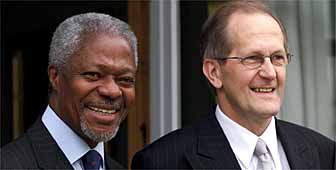Deiss and Annan insist on human rights in Middle East

Swiss Foreign Minister Joseph Deiss has met with United Nations Secretary-General Kofi Annan to discuss human rights in the Occupied Territories.
Deiss met the Nobel Peace Prize winner in Geneva, after Annan’s speech to the annual session of the UN Human Rights Commission.
In his address Annan focused on the need to respect international human rights laws, a position the Swiss cabinet approved in a diplomatic initiative earlier this week.
The Swiss initiative seeks to make respect for international humanitarian law central to any search for peace. The Swiss believe a commitment from both sides not to violate human rights is an essential first step, preceding even a ceasefire.
“An end to human rights violations [in the Occupied Territories], starting with the free movement of ambulances in the area, would significantly contribute to a reduction in violence and would improve the situation for ordinary citizens,” Deiss said following his meeting.
The foreign minister was also quick to point out that Switzerland was still considering its relationship with Israel, adding that its military and economic ties with the Jewish state were under consideration.
Massive violations
During his speech, Annan said human rights violations were being carried out “on a massive scale” in the Palestinian Territories. He said targeting civilians and using disproportionate force violated international humanitarian law and was unacceptable.
“One of the lessons of history is that the United Nations cannot afford to be neutral in the face of great moral challenges. We are faced with such a moral challenge today,” Annan told the commission members.
“Wanton disregard for human rights and humanitarian law is something we cannot accept. We must let those responsible know they face the verdict of history,” he continued.
International force
After his speech, Annan told reporters that the humanitarian and human rights situation was so “appalling” that an international force should be sent to the region.
Deiss told reporters that Switzerland had not yet discussed the possibility of sending troops to the region.
ICRC
The dire humanitarian situation was also mentioned by Paul Grossrieder, Director General of the International Committee of the Red Cross (ICRC), who has recently returned from a visit to the region.
He said the ICRC president, Jakob Kelleberger, had written to Israeli Prime Minister Ariel Sharon, on Thursday to officially protest the way humanitarian workers were being prevented from doing their jobs.
He said assurances he had been given by senior members of the Israeli Defence Force were not being implemented on the ground. Although there had been slight improvements in the ICRC’s ability to do its work in certain places, the situation in the Jenin refugee camp was “totally unacceptable”, Grossrieder said.
Deaths and humiliation
He criticised the “useless humiliations” his staff and those of the Palestinian Red Crescent (PRC) had had to endure at the hands of Israeli soldiers, for example, being forced to lie in the mud with their hands behind their heads, or to strip naked. He said that on a number of occasions, Palestinian ambulance drivers had been used as human shields by Israeli soldiers.
At the same press conference, Didier Cherpitel, Secretary-General of the Federation of Red Cross and Red Crescent Societies said that since the start of the Israeli reoccupation, two PRC staff members had been killed, 17 wounded and 28 arrested, including the society’s president.
The two officials raised the spectre of epidemics breaking out because the water and sewage systems had collapsed and because the Israeli army were preventing corpses from being removed. They said some 10-12,000 people were not receiving adequate food supplies.
“The humanitarian crisis is already there. It’s already quite catastrophic. We should not wait for a humanitarian disaster before intervening,” Grossrieder told swissinfo.
According to the ICRC and Switzerland, these actions that target civilians or deprive them of basic humanitarian supplies constitute a breach of the Fourth Geneva Convention, which covers the treatment of civilian populations in wartime and under military occupation.
“Obey” Conventions
In his speech, Annan had mounted a vigorous defence of the Geneva Conventions, rejecting suggestions that they should be reinterpreted.
“Their purpose is crystal clear and their wording is broad enough to apply in all armed conflicts, no matter what the specific circumstances,” Annan said. “From now on they should be obeyed.”
The 53-nation Human Rights Commission is scheduled to vote on Friday on an Arab-sponsored resolution that accuses Israel of “gross violations of human rights and international humanitarian law.”
by Roy Probert and agencies

In compliance with the JTI standards
More: SWI swissinfo.ch certified by the Journalism Trust Initiative
You can find an overview of ongoing debates with our journalists here . Please join us!
If you want to start a conversation about a topic raised in this article or want to report factual errors, email us at english@swissinfo.ch.